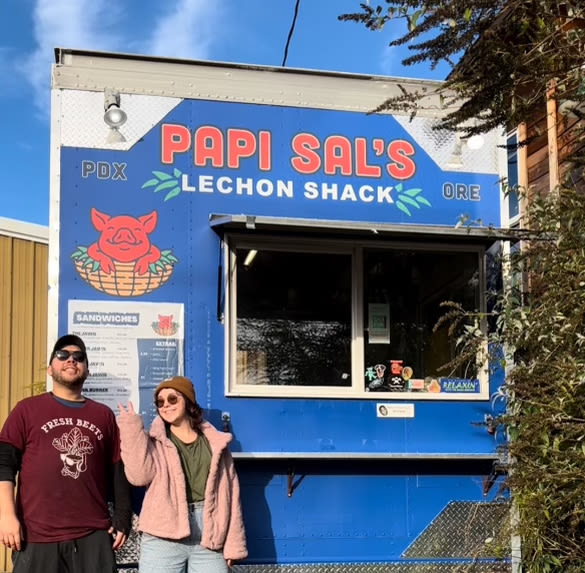Food Carts Are the Heart of Portland’s Food Culture. Could January 2023 Regulations Change That?

Every local has their tried and true favorites, while tourists eagerly check boxes on their must-try lists in Portland’s thriving food cart scene. There are so many carts in the city that keeping an exact count is impossible—but the number tops 500. A lone cart might spring up next to a corner store, a pod might take root in an empty parking lot, and, lately, luxe pods with beer bars, real bathrooms, and heated, covered seating have proliferated. Carts are as unique as the people who run them; you can get anything from wood-fired Mormon grandma cuisine to Chinese street-food crêpes. Part of the reason why carts are so popular here: there’s a low barrier to entry to starting one, with lower upfront costs and less regulation involved than with brick-and-mortar restaurants. But with new regulations regarding food carts and food cart pods taking effect on January 1, 2023, some cart owners are worried about their ability to keep their businesses open, and some have already made the decision to temporarily close, including Meliora Pasta and Papi Sal’s.
The trickiest new regulation is one regarding the disposal of wastewater from carts. Wastewater includes water used to wash hands, dishes, and pots, and it may contain grease, bacteria, soap, and food particles. Carts can dispose of wastewater in three ways—by connecting directly to the sewer with a grease interceptor, by collecting water in the cart’s small onboard wastewater tank and frequently emptying that tank, or by collecting water in a large wastewater cube adjacent to the tank. New statewide mobile food unit laws declare that “all operations and equipment must be integral to the unit,” meaning carts can no longer use large wastewater cubes—and that can pose a significant challenge to those businesses.
“We have had many years of documentation of wastewater spills happening, tanks getting cracked, broken into, and they go into the stormwater drains and into the Willamette,” says Jeff Martin from the Multnomah County Health Department, which enforces the state rules.
The owners of Meliora Pasta, an Italian-inspired cart that opened in February 2022 and was most recently located at the Bantu Island food cart pod on NE Alberta Street and 15th Avenue, have already made the decision to close temporarily. Co-owner Jim Millar says that when he moved into the Bantu pod last summer, he was told that upgrades would be made by January to allow carts to connect to the sewer, but those upgrades have not yet taken place. Earlier this year, he was sharing a 500-gallon wastewater cube with a neighboring cart, and paid $250 once every three weeks to have it emptied removed by a licensed wastewater removal company.
Without a sewer connection and without a large wastewater cube, the only option available is to use the cart’s smaller onboard wastewater tank. Under new city rules, cart owners can haul up to 20 gallons at a time themselves, or they can hire a licensed wastewater removal service to empty the onboard tank, which might hold 75 gallons. But some carts can easily go through 50 gallons a day, says Millar. That means some would need a wastewater disposal service to come once a day—and that’s just not feasible with the small number of wastewater disposal operators in town. Due to the cost and logistical difficulty of daily hauling, Millar has decided to close the Meliora Pasta cart for the foreseeable future, opting instead for pop-up dinners at the former Yonder space until he can find an affordable cart space with a sewer hookup.
Though there are many licensed wastewater haulers in the state, there are only two in the area who can handle wastewater for food carts, says Leah Tucker, a former food cart owner who advocates for food carts through the nonprofit she founded, the Oregon Mobile Food Association. The situation is even tougher in rural areas of the state, which may not be able to be serviced by wastewater removal regularly. “Across every industry, there was a massive reduction in staff [during the pandemic],” says Tucker. “The wastewater pumping industry is no different. But mobile units blossomed during that time, because restaurants were closing and restaurateurs wanted to continue doing what they love. We had more units, less pumping … there had to be a break point. You have 400 customers and only two pumping trucks.”
“It already takes over a week to schedule gray water removal systems,” says Millar. “It’s just not feasible … their schedules are already so full as it is.”
It’s also expensive to get wastewater tanks pumped frequently. Leo Mendoza, owner of the Taco Gang food cart, went from getting a large cube pumped once a month to a small onboard tank pumped once a week. “It’s triple [what it used to cost] every month,” he says.
Meanwhile, Jess Mummery, co-owner of Papi Sal’s, says their cart closed because Great Notion abandoned plans to build a taproom—which would have included a sewer hookup—and daily wastewater removal would have cost $70 per day. “We were between a rock and a hard place with where to put the cart,” she says. She and business partner John Hatch plan to do Puerto Rican platter pop-ups and will reconsider opening their cart at a new location in the spring, when business tends to pick up.
Though many newer pods are now built with sewer hookups, many older ones rely on wastewater tanks. The cost of connecting to the sewer underground can be high. Rico Loverde, owner of burger cart Monster Smash, and his cotenant, Belmont Station, are facing rent increases for the next two years to cover the $18,000 cost of connecting the cart to the sewer.
Meanwhile, Tess Kies, who owns the food cart pod at 2623 Belmont St, says she found the cost of making improvements prohibitive. “I’ve got a bid for a contractor that’s $30,000, and we’re not gonna do that,” she says. “I know we won’t keep [the pod] if the cost is outrageous. I’m concerned that [a lot of the carts around the city] are going to be put out of business.”
Though these regulations were put in place in early 2020, many food cart owners and food cart pod owners said they were unaware of the regulations until recently, making it particularly hard to adapt to these expensive changes during winter, which is traditionally a slow season for their business. An email from the city in English and Spanish was repeatedly sent to Portland food cart owners—and Loverde reported he didn’t begin receiving that email until late August.
Martin says the county health department has provided this information to carts in a number of ways. “We [let them know] through our plan review process that you need to plan on having a sanitary sewer connection or regular routine pumping where you don’t rely on a wastewater cube outside of the mobile unit. We would also provide information during inspections. Over the past couple months, we’ve also been using flash notifications [via email] to make sure all mobile units are aware of this,” he says.
But Martin says he doesn’t want carts to close because of the new regulations. “It’s not an immediate closure at all, but we will work with them to make sure that they understand they need to come up with a plan on how they’re going to achieve compliance,” he says—whether that involves doing construction or having more frequent pickups from internal tanks.
In the meantime, Tucker has filed a request with the health department to give food carts another eight months to comply with the regulations. After all, Tucker notes, the January 2023 guideline was put in place before the pandemic began.
“Nobody had any idea that this was gonna last three years. So by the time the health department or anybody was really able to focus on anything beyond just survival, so much time had passed. And now suddenly we’re looking down the barrel of the three-year mark, and nobody knew [about the guidelines],” says Tucker. “We understand that extenuating circumstances were at hand why we didn’t get the information sooner. But now we need their help—and we need more time.”
